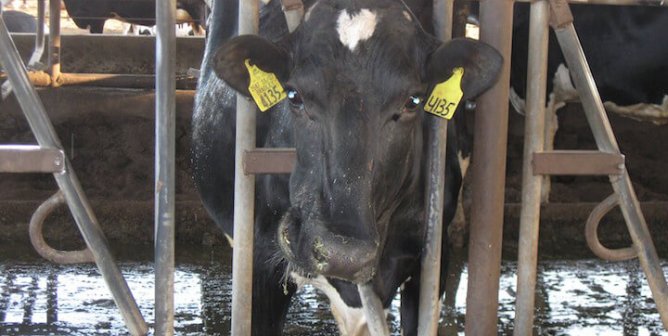What is the natural human diet? Are humans natural meat-eaters? Quick test: When you see dead animals on the side of the road, are you tempted to stop and snack on them? Do you daydream about killing cows with your bare hands and eating them raw? If you answered “no” to these questions, then, like it or not, you’re an herbivore.
The following points help prove that a natural human diet is, in fact, vegan—and that enslaving animals, stealing their milk and eggs, and killing them simply isn’t what nature intended.
Think you’re a paleo caveman or -woman? Well …
Although many humans choose to eat both plants and meat, earning us the dubious title of “omnivore,” we’re anatomically herbivorous. The good news is that if you want to eat like our ancestors, you still can: Nuts, vegetables, fruit, and legumes are the basis of a healthy vegan lifestyle.
Our Teeth, Jaws, and Nails
Humans have short, soft fingernails and small “canine” teeth. In contrast, carnivores all have sharp claws and large canine teeth that are capable of tearing flesh.
Carnivores’ jaws move only up and down, requiring them to tear chunks of flesh from their prey and swallow them whole. Humans and other herbivores can move their jaws up and down and from side to side, allowing them to grind up fruit and vegetables with their back teeth. Like other herbivores’ teeth, humans’ back molars are flat for grinding fibrous plant foods.
Dr. Richard Leakey, a renowned anthropologist, summarizes, “You can’t tear flesh by hand, you can’t tear hide by hand. Our anterior teeth are not suited for tearing flesh or hide. We don’t have large canine teeth, and we wouldn’t have been able to deal with food sources that require those large canines.”
Stomach Acidity
Carnivorous animals swallow their food whole, relying on extremely acidic stomach juices to break down flesh and kill the dangerous bacteria in it, which would otherwise sicken or kill them. Our stomach acids are much weaker in comparison, because strong acids aren’t needed to digest prechewed fruits and vegetables.
Intestinal Length
Animals who hunt have short intestinal tracts and colons that allow meat to pass through their bodies relatively quickly, before it can rot and cause illness. Humans’ intestinal tracts are much longer than those of carnivores of comparable size. Longer intestines allow the body more time to break down fiber and absorb the nutrients from plant-based foods, but they make it dangerous for humans to eat meat. The bacteria in meat have extra time to multiply during the long trip through the digestive system, increasing the risk of food poisoning. Meat actually begins to rot while it makes its way through human intestines, which increases the risk of developing colon cancer.
Human Evolution and the Rise of Meat-Heavy Diets
If it’s so unhealthy and unnatural for humans to eat meat, why did our ancestors sometimes turn to flesh for sustenance? Author of the book The Power of Your Plate, Dr. Neal Barnard, talks about humans’ early diet, explaining that we “had diets very much like other great apes, which is to say a largely plant-based diet …. [M]eat-eating probably began by scavenging—eating the leftovers that carnivores had left behind. However, our bodies have never adapted to it. To this day, meat-eaters have a higher incidence of heart disease, cancer, diabetes, and other problems.”
Briana Pobiner, paleoanthropologist at the Smithsonian’s National Museum of Natural History, adds, “[F]ruit and different plants and other things that we may have eaten maybe became less available. . . . The meat-eating that we do, or that our ancestors did even back to the earliest time we were eating meat, is culturally mediated. You need some kind of processing technology in order to eat meat .… So I don’t necessarily think we are hardwired to eat meat.”
There’s Something About Dairy
Humans started domesticating cattle only 10,000 years ago. Until then, children who stopped breastfeeding also stopped making the enzyme lactase and became lactose intolerant. After the domestication of cattle, however, the human digestive tract began to process dairy “products.” Groups who do not rely on cattle—like the Pima tribe, the Chinese and Thai, and the Bantu of West Africa—continue to be lactose intolerant today.
The Unfortunate Modern Diet
Until recently, only the wealthiest people could afford to feed, raise, and slaughter animals for meat, while everyone else ate mostly plant foods. Consequently, prior to the 20th century, only the rich were plagued routinely with diseases such as heart disease and obesity.
Now that animal flesh has become relatively cheap and is easily available (thanks to the cruel, cost-cutting practices of farming), deadly ailments such as heart disease, strokes, cancer, diabetes, and obesity have spread to people across the socio-economic spectrum. And as the Western lifestyle spills over into less-developed areas of Asia and Africa, people there, too, have begun to suffer and die from diseases associated with meat-based diets.
When humans consume animal protein, research shows a link to cancer of the colon, breast, prostate, and pancreas. According to nutrition expert T. Colin Campbell, the director of the Cornell-China-Oxford Project on Nutrition, Health, and the Environment, “In the next ten years, one of the things you’re bound to hear is that animal protein . . . is one of the most toxic nutrients of all that can be considered.”
If this article is making you question your current diet, then we have just the thing for you: our free vegan starter kit, with tips and information about going vegan.
For animals, the environment, and your health, order one today.






